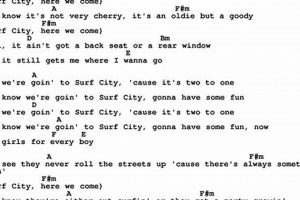A collegiate summer baseball team, based in a coastal New Jersey city, provides aspiring athletes an opportunity to hone their skills in a competitive environment. This team offers a platform for players from various colleges to showcase their talent during the off-season. For instance, a shortstop from a university in Pennsylvania might spend the summer playing for this team, gaining valuable experience.
The existence of this team fosters community engagement, attracting local fans to games and contributing to the city’s tourism. It provides affordable entertainment for families and offers young athletes a chance to be mentored by experienced coaches. Historically, such teams have served as stepping stones for players seeking professional baseball careers, some even making it to the major leagues.
The following sections will explore various facets of this collegiate summer baseball experience, including player development, community impact, and the economic contributions to the region.
Guidance for Aspiring Collegiate Baseball Players
The following offers insights for those seeking a competitive summer baseball experience within a structured organization.
Tip 1: Demonstrate Fundamental Proficiency: Mastery of baseball basics is paramount. Players should exhibit consistent throwing accuracy, reliable fielding, and sound hitting mechanics. Consistent execution of fundamental skills provides a solid foundation for advancement.
Tip 2: Cultivate a Strong Work Ethic: Dedication to improvement through focused practice and diligent training is essential. Players should actively seek opportunities to refine their skills, exhibiting a proactive approach to development.
Tip 3: Maintain Physical Conditioning: Peak athletic performance requires a commitment to physical fitness. Players should engage in regular strength training, conditioning exercises, and proper nutrition to optimize their physical capabilities.
Tip 4: Exhibit Mental Fortitude: Baseball is a game of failure. Players should develop the ability to handle adversity, maintain composure under pressure, and learn from mistakes. Resilience and a positive attitude are crucial for success.
Tip 5: Foster Teamwork and Sportsmanship: Baseball is a team sport. Players should prioritize the team’s success, support their teammates, and conduct themselves with integrity on and off the field. Demonstrating respect for opponents and umpires is essential.
Tip 6: Seek Mentorship and Guidance: Actively engage with coaches and experienced players to gain valuable insights and advice. Players should be receptive to feedback and willing to learn from others’ experiences.
Tip 7: Display Consistent Performance: Demonstrating consistent competence is key to earning playing time and showcasing talent. A player’s value is strongly enhanced with consistent output over the course of multiple games.
These guidelines emphasize the importance of fundamental skills, physical conditioning, mental fortitude, and teamwork. Adherence to these principles will enhance the player’s chances of success.
These principles directly relate to the team’s overall success, which will be discussed in subsequent sections.
1. Player Development
Player development forms a cornerstone of the collegiate summer baseball experience, directly influencing the skills and potential of participating athletes. The focus on honing baseball proficiencies is a central tenet of participation.
- Enhanced Skill Refinement
Participation offers focused instruction and repetition aimed at improving fundamental baseball skills. For instance, batting practice routines may be tailored to address specific weaknesses in a player’s swing, while fielding drills emphasize quick reactions and accurate throws. This concentrated training accelerates skill development beyond what might be achieved during the regular college season.
- Competitive Game Experience
Regularly playing against other talented college athletes provides invaluable experience under pressure. Players encounter diverse pitching styles, challenging defensive scenarios, and high-stakes offensive situations. This competitive environment cultivates composure, decision-making skills, and the ability to perform consistently when it matters most. An example would be a pitcher facing batters that are also highly scouted in the same manner.
- Exposure to Professional Scouting
Opportunities to showcase skills in front of professional baseball scouts increase exposure to opportunities. Scouts attend games to evaluate players’ potential for the professional ranks. A strong performance during the summer season can significantly improve a player’s draft prospects. For instance, a player demonstrating improved velocity on their fastball might attract increased attention from scouts.
- Personalized Coaching and Mentorship
Access to experienced coaches and mentors provides individualized guidance and support. Coaches offer constructive criticism, technical adjustments, and strategic insights tailored to each player’s unique needs. This personalized attention fosters confidence, promotes growth, and helps players unlock their full potential. A coach’s experienced advice for different fielding positions can further improve a fielder’s range, accuracy, and efficiency.
These facets directly correlate with an athlete’s ability to enter into higher baseball organizations and allow for the improvement of all areas of player performance, which aligns perfectly with the goals of the collegiate summer baseball.
2. Community Impact
The presence of the collegiate summer baseball team within the coastal New Jersey city generates a discernible impact on the surrounding community. This impact extends beyond the realm of sports, influencing local economics, social cohesion, and civic engagement.
- Economic Contributions
The team’s operations contribute to the local economy through various channels. Tourism is stimulated as fans travel to attend games, supporting local businesses such as restaurants, hotels, and retail establishments. For example, visiting families might stay overnight, dine at local eateries, and purchase team merchandise, injecting revenue into the city’s economy. These economic benefits, while potentially variable, provide supplementary income for the region.
- Civic Pride and Community Spirit
The team serves as a source of civic pride, uniting residents in support of a shared endeavor. Attending games fosters a sense of community spirit, allowing individuals to connect and celebrate their local team. For instance, community nights or special events might draw large crowds, strengthening bonds and promoting positive social interactions. The organization could further bolster civic duties and pride by providing community service events with the organization’s baseball players.
- Recreational Opportunities
The team provides affordable entertainment options for families and individuals. Games offer an accessible and engaging recreational activity, particularly during the summer months. For example, families might attend games together, enjoying the atmosphere and creating lasting memories. Tickets are usually low in cost to promote attendance by both locals and tourists, which would bolster a good reputation and consistent fan base.
- Youth Engagement and Inspiration
The presence of the team inspires young baseball enthusiasts and promotes youth engagement in sports. Local youth baseball leagues might organize outings to attend games, allowing young players to witness high-level baseball and aspire to similar achievements. The organization could also partner with local schools and youth organizations to host baseball clinics or mentorship programs. This promotes continued growth and allows local youths the opportunity to improve their fundamental baseball skills.
These elements collectively demonstrate the multifaceted impact of the team on the local community. From bolstering the economy to fostering civic pride and providing recreational opportunities, the team’s presence contributes significantly to the well-being and vibrancy of the city. These positive effects directly relate to the team’s purpose and importance, which will be expanded upon in the following sections.
3. Summer Competition
Summer competition is an intrinsic element of the collegiate baseball experience in Atlantic City. The seasonal nature of the league provides a structured environment for players to refine their skills during the college off-season. This competition directly impacts player development, providing opportunities for growth that may not be available during the academic year. For instance, a pitcher might work on developing a new pitch under the guidance of a summer coach, testing its effectiveness against live hitters in game situations. This intensive period of competitive play accelerates learning and allows players to hone their abilities in a focused setting. The intensity that summer baseball provides may also improve a college player’s resilience and fortitude against highly talented teams in college baseball.
The competitive aspect also extends to team performance. While individual development is a priority, teams strive to win games and compete for league championships. This fosters a team-oriented environment where players learn to work together towards a common goal. An example is the implementation of team strategies based on situational baseball (e.g., hit and runs, situational bunts, etc.) which improve the performance of individual players. These strategies emphasize collective decision-making and enhance the team’s overall competitiveness. The constant pressure to perform, both individually and as a team, simulates the demands of professional baseball, further preparing players for future opportunities.
In summary, summer competition serves as a vital component of the collegiate baseball experience in Atlantic City. It drives player development, fosters teamwork, and prepares athletes for the next level of their careers. The competitive environment provides a platform for growth, both on and off the field, contributing to the overall success of the league and the individual players who participate. However, the increased play during the summer also provides an additional opportunity for baseball related injuries, so training staff should be prioritized, and players should be constantly checked for wear and tear throughout the season.
4. Local Entertainment
The intersection of local entertainment and collegiate summer baseball in Atlantic City offers a dynamic synergy that benefits both residents and visitors. The presence of the baseball team augments the city’s entertainment offerings, providing an alternative to traditional attractions and contributing to a diverse leisure landscape. The team allows fans to support local baseball organizations, and the baseball players also gain experience during their college off-season.
- Affordable Family Activity
Baseball games present an affordable and accessible entertainment option for families seeking recreational activities. Ticket prices are often lower than those of other major entertainment venues, making games an attractive choice for budget-conscious families. Concession stands also provide a food and beverage choice. For example, a family of four can attend a game, enjoy refreshments, and experience live sports without incurring excessive expenses.
- Community Gathering Point
The ballpark serves as a community gathering point, fostering social interaction and strengthening local bonds. Residents come together to support their team, share experiences, and build relationships. The organization can also create promotional community nights, which can further involve and include local organizations. This sense of community contributes to the overall quality of life in Atlantic City, providing a positive and unifying experience.
- Alternative to Traditional Tourism
Collegiate summer baseball provides an alternative to the city’s conventional tourism offerings, attracting visitors who may not be interested in casinos or beaches. The team’s presence diversifies the city’s appeal, catering to sports enthusiasts and broadening the range of attractions available to tourists. Some hotels and businesses may also provide discounts to those that attended certain games. The organization can further promote the tourist and economic benefit by providing package deals or discounts between local tourism organizations.
- Enhancement of Local Businesses
The team’s presence can indirectly benefit local businesses by attracting customers and generating economic activity. Fans attending games may patronize nearby restaurants, bars, and shops, boosting revenue for local establishments. Further, promoting local businesses through promotional materials or stadium advertisements can further boost revenue and economic opportunities.
In conclusion, collegiate summer baseball provides a valuable form of local entertainment in Atlantic City. Its affordability, community-building aspects, contribution to tourism diversity, and support for local businesses collectively enhance the city’s appeal and contribute to its overall economic and social vitality. Further promotions and integration with local businesses could promote further growth and opportunity in the region.
5. College Athletes
The participation of college athletes is fundamental to the existence and success of collegiate summer baseball. These athletes, drawn from various colleges and universities, form the core of the teams and contribute significantly to the league’s competitive landscape and community engagement.
- Skill Development and Exposure
Collegiate summer baseball provides a platform for college athletes to enhance their skills during the off-season. The competitive environment and focused coaching facilitate individual improvement and offer increased exposure to professional scouts. An example would be a pitcher refining a specific pitch type to improve the athlete’s value. The increased exposure can lead to enhanced draft opportunities for certain athletes.
- Maintaining Competitive Edge
Participation in the summer league allows college athletes to maintain their competitive edge during the break from their college teams. Regularly playing games and engaging in training activities prevents skill degradation and ensures athletes remain prepared for the upcoming college season. Consistent play helps maintain and improve upon performance.
- Geographic Representation
College athletes from diverse geographic locations converge to participate, fostering cultural exchange and broadening perspectives within the teams and the community. This diversity enhances the team’s dynamic and promotes understanding among athletes from different backgrounds. Examples would be players from California, New York, and Florida playing on the same team.
- Role Models and Inspiration
College athletes often serve as role models for aspiring young baseball players in the community. Their dedication, work ethic, and sportsmanship inspire younger athletes to pursue their own athletic goals. Local youth baseball teams may also attend the events, exposing youths to athletic talent. These athletes are a source of motivation for local youth, encouraging participation in baseball and promoting a healthy lifestyle.
In summary, college athletes are integral to the collegiate summer baseball experience. Their participation drives the league’s competitiveness, fosters skill development, and promotes community engagement. The summer season offers these athletes valuable opportunities for growth and exposure, contributing to their overall development as baseball players and individuals.
Frequently Asked Questions about Collegiate Summer Baseball
The following addresses common inquiries regarding the experience, aiming to clarify key aspects for players, families, and community members.
Question 1: What is the primary purpose of collegiate summer baseball?
The primary purpose is to provide college baseball players an opportunity to develop their skills, gain competitive experience, and showcase their talents during the summer months. It serves as a bridge between college seasons, allowing for continuous improvement.
Question 2: How does participation benefit college baseball players?
Participation offers numerous benefits, including skill refinement, exposure to professional scouts, increased game experience, and opportunities to work with experienced coaches. These factors contribute to overall player development and enhance future prospects.
Question 3: What is the typical duration of the summer baseball season?
The typical duration of the summer baseball season is approximately two to three months, generally spanning from late May or early June to August. This timeframe allows for a concentrated period of training and competition.
Question 4: How are players selected for collegiate summer baseball teams?
Player selection varies depending on the league and team. Typically, coaches and team personnel evaluate players through tryouts, recommendations from college coaches, and assessments of their performance during the college season. Talent and potential are the primary considerations.
Question 5: Is housing provided for players participating in summer baseball?
Housing arrangements differ among teams and leagues. Some teams provide housing for players, often through host families or dormitory-style accommodations. Other teams may require players to find their own housing. The specific arrangements should be clarified with the team prior to participation.
Question 6: What level of competition can players expect in collegiate summer baseball?
The level of competition is generally high, as the leagues consist of talented college players from across the country. The games are often competitive and closely scouted, providing a challenging and rewarding experience for participating athletes.
In summary, collegiate summer baseball offers a structured and competitive environment for college players to refine their skills and gain valuable experience. It is an avenue for continued growth and exposure within the baseball community.
The following section will transition to a more in-depth analysis of the league’s organizational structure and its impact on player recruitment.
Concluding Remarks on Collegiate Summer Baseball
This examination of collegiate summer baseball has highlighted its multifaceted role in player development, community engagement, and local entertainment. The competitive environment fosters skill refinement, while the team’s presence contributes to the economic and social vitality of the region. College athletes benefit from increased exposure and continued opportunities for improvement, shaping their potential future in baseball. The Atlantic City Surf baseball is the keyword term we use to this article.
Continued support and strategic development are crucial to sustain the positive impact of collegiate summer baseball. Investing in infrastructure, fostering community partnerships, and prioritizing player well-being will ensure its continued success as a valuable asset to both the athletes involved and the communities they represent. Understanding the importance of organizations such as Atlantic City Surf baseball is essential for furthering baseball opportunities.


![Best Mini Golf Surf City Fun: [Your City] Guide! Learn to Surf & Skate: A Beginner's Step-by-Step Guide Best Mini Golf Surf City Fun: [Your City] Guide! | Learn to Surf & Skate: A Beginner's Step-by-Step Guide](https://universitysurfandskate.com/wp-content/uploads/2026/01/th-873-300x200.jpg)




